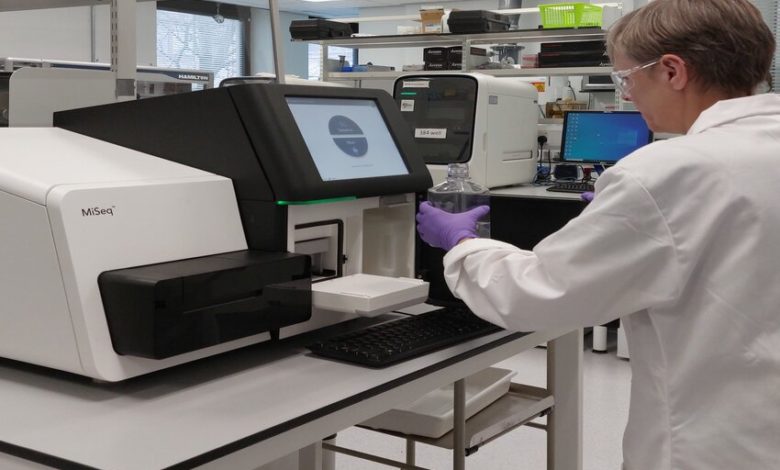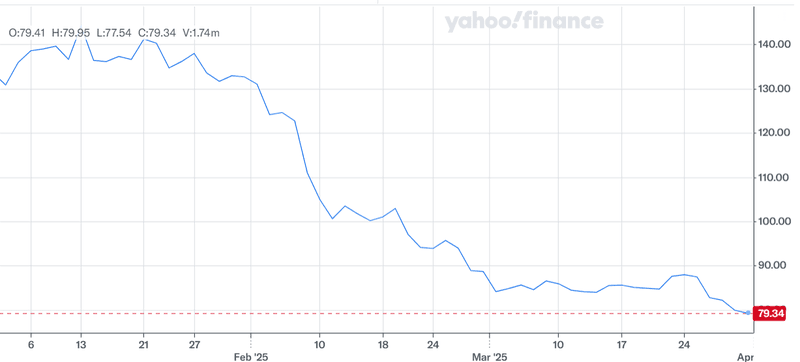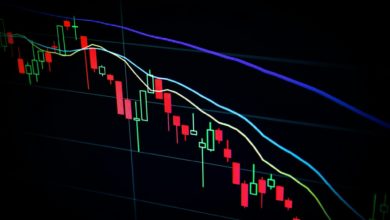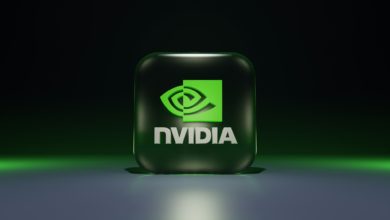China, Chaos & a $1 Billion Mistake: What’s Really Going on at Illumina?

Gene-sequencing powerhouse Illumina (NASDAQ:ILMN) has found itself at a critical crossroads. On March 25, 2025, the company confirmed that activist investor Keith Meister of Corvex Management will be joining its board of directors. Meister’s hedge fund currently holds a 2.5% stake in the firm and has signaled its intention to push for improved execution, profitability, and revenue growth. The board reshuffle also includes the elevation of former FDA commissioner and current board member Scott Gottlieb to the position of chairman, replacing Stephen MacMillan. This shake-up follows a series of turbulent years for Illumina, which has struggled with regulatory roadblocks, global trade tensions, and lingering effects of past strategic missteps—particularly the ill-fated Grail acquisition. These changes come on the heels of a difficult earnings call that saw executives acknowledge operational headwinds in China, stagnating revenue growth, and the need for cost-cutting measures. Illumina’s latest moves underscore a broader need for internal recalibration—one that activist investors now seem poised to influence directly.
Geopolitical & Regulatory Pressures: The China Setback
Illumina's longstanding presence in China—accounting for approximately 7% of its global revenue—has come under severe threat due to geopolitical tensions and retaliatory regulatory actions. In a surprise move, China’s Ministry of Commerce recently added Illumina to its list of “unreliable entities,” effectively banning sales of its gene-sequencing machines in the country. This development occurred amid escalating tariff conflicts, severely restricting Illumina's ability to operate in a critical and growing market for genomics and biotechnology. Despite reassurances from management that they are “in dialogue with the relevant parties” and that they will continue serving customers in the region, the situation remains fluid, with no clear resolution in sight. Illumina has not incorporated the impact of this restriction into its 2025 guidance, raising concerns among investors about underestimation of risk. Moreover, the company refrained from offering a detailed breakdown of its clinical vs. research exposure in China, which has created an additional layer of opacity for analysts and shareholders attempting to assess the full impact. The geopolitical blow comes just as Illumina was beginning to see some modest sequential growth in China, further complicating recovery efforts. Given the company’s historic reliance on global scale and its role as a technology provider across borders, the inability to access or grow in China creates a significant headwind. In this context, activist involvement becomes increasingly relevant—not only to provide greater scrutiny over risk management but also to push for clearer strategic decisions and contingency plans in an unpredictable geopolitical landscape.
Execution Missteps & The Aftermath Of The Grail Debacle
The echoes of the Grail acquisition still haunt Illumina’s strategic direction. The $8 billion deal to acquire the early-stage cancer detection company—executed despite regulatory pushback from both U.S. and European authorities—was a catalyst for major internal disruption. The transaction attracted the ire of prominent activist investor Carl Icahn, who launched a proxy battle in 2023 that resulted in board changes and the eventual departure of then-CEO Francis deSouza. Although Grail is now excluded from Illumina's financials and strategic narrative, the reputational and operational consequences of the failed deal linger. The current leadership, including new CEO Jacob Thaysen and CFO Ankur Dhingra, is working to distance the company from the fallout, but progress remains incremental. During the latest earnings call, the focus was on stabilizing the core business—emphasizing the NovaSeq X system rollout, cost reductions, and multiomic innovations—but revenue growth remained flat at just 1% year-over-year in Q4 2024. Meanwhile, share prices have plunged 34% year-to-date, reflecting persistent market skepticism. Activist oversight, such as that now being introduced through Corvex, is seen as necessary to ensure more disciplined capital allocation, tighter governance, and accountability for prior decisions that damaged shareholder value. It also signals to the market that investors are no longer willing to accept strategic overreach without sufficient risk assessment or financial return. With Keith Meister—a former top executive under Icahn—now at the boardroom table, shareholders are betting that past lessons will be heeded, and future strategies will be rooted in a more cautious and execution-focused mindset.
Underwhelming Financial Performance Despite Strategic Overhauls
Despite a major corporate strategy refresh, Illumina’s financial results continue to show only tepid signs of recovery. For Q4 2024, the company reported revenue of $1.1 billion—up a modest 1% year-over-year—and provided full-year 2025 guidance that projects low single-digit revenue growth on a constant currency basis. Even as leadership emphasized strategic progress, including operational streamlining, the deployment of NovaSeq X, and new partnerships with firms like NVIDIA and Truveta, these efforts have yet to materially boost top-line performance. Illumina expects a 170 basis point operating margin improvement in 2025 to approximately 23%, and diluted EPS in the range of $4.50 to $4.65—both commendable in a vacuum but insufficient given the scale of past R&D investment, which remains just shy of $1 billion annually. Moreover, capital expenditure and share repurchase activity remain conservative, suggesting constrained flexibility. Notably, there was no clear contingency plan shared regarding the potential financial downside from the China ban—an omission that further clouds visibility for investors. Even within core sequencing instrument revenues, a low single-digit decline is expected in 2025, attributed to cautious capital expenditure from customers. These financial trends indicate that while cost controls are improving, revenue generation remains lackluster. Activist investors typically look for such disconnects between strategic ambition and financial output as areas ripe for intervention. With Meister’s arrival, there is likely to be a renewed push for aligning performance metrics with shareholder expectations, especially as Illumina aims to return to high single-digit growth by 2027. The concern remains that without sustained activist pressure, financial discipline may take a backseat to optimistic roadmaps.
Competitive Pressure & Market Share Risk In A Changing Landscape
Illumina has long dominated the genetic sequencing market, but its position is increasingly being challenged by nimble competitors and evolving customer demands. Emerging rivals are reportedly securing high-profile deals—including with institutions like UK Biobank and the Chan Zuckerberg Initiative—for new proteomic and single-cell applications, threatening Illumina’s traditional stranglehold on research-grade sequencing contracts. In parallel, Illumina is pushing forward with its own innovations—such as the MiSeq i100, NovaSeq X upgrades, and a new proteomics workflow developed with Standard BioTools—but adoption remains in early stages, and margin expansion is only just beginning to materialize. On top of that, customer feedback has prompted discussions around application-specific pricing models to preserve partner margins, signaling pressure on Illumina’s historical pricing power. Meanwhile, the shift to multiomics demands a more agile, integrated product suite and robust compute capabilities—something Illumina is addressing through its collaboration with NVIDIA, aimed at leveraging GPUs and AI for more efficient data analysis. However, many of these efforts remain nascent, while competitors aggressively undercut pricing and pursue sovereign genome sequencing deals with an eye on scale. The potential risk is that Illumina’s innovation cycle may not match the pace of industry change, especially with customer preferences shifting toward value, speed, and data integration. In such a landscape, activist oversight becomes increasingly relevant to ensure that product roadmaps, R&D allocation, and partnership models stay competitive. Keith Meister’s background in strategic turnarounds may help enforce a more commercially-minded approach, especially as Illumina seeks to navigate a rapidly evolving genomics ecosystem.
Conclusion: A Complex Picture Demanding Nuanced Evaluation

Source: Yahoo Finance
Illumina’s recent boardroom changes, strategic resets, and geopolitical challenges was bound to have a negative impact on its stock price as we can see in the above chart. The company is trading at an LTM EV/ Revenue multiple of 3.2x down from 5.11x in March 2024. Also, its LTM EV/ EBITDA multiple of 17.40x is down from 50.95x in March 2024. However, do not let the lower valuations fool you given the fact that wide execution gaps, competitive threats, and global regulatory risks continue to weigh on Illumina’s performance and sentiment. The arrival of activist investor Keith Meister marks a potentially pivotal moment in Illumina’s journey—one that could lead to improved accountability and strategic clarity. However, the ultimate impact will depend on how well the company responds to external pressures and internal demands.




